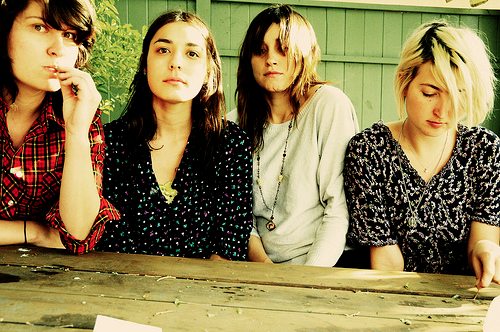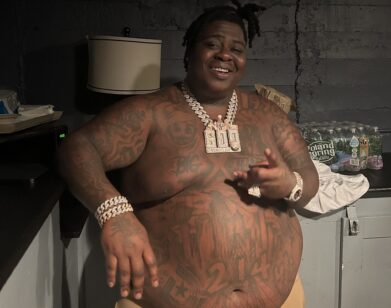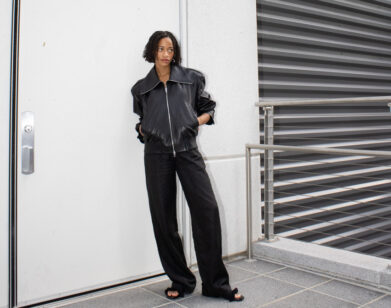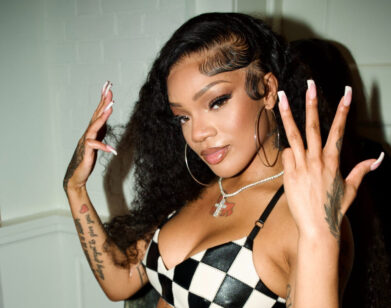Putting on Warpaint

THERESA WAYMAN (SECOND FROM RIGHT) WITH HER WARPAINT BANDMATES.
PHOTO COURTESY OF MIA KIRBY
Los Angeles-based warpaint doesn’t look much like your average 2011 post-punk band—all four members are women, with great hair and California good looks, for one thing. They don’t sound much like anyone else, either, possibly because they’ve had so much time to cultivate their sound: their debut full-length, The Fool, came out in October of last year; but the group has been together in some iteration since 2004, and members Theresa Wayman, Jenny Lee Lindberg, and Emily Kokal have been friends since childhood (drummer Stella Mozgawa joined a little later). The Fool will be rereleased in a deluxe edition—including the entirety of Warpaint’s Exquisite Corpse EP and two extra songs—on Monday, and if you missed it the first time around, you’d do well to give it a listen: their heady, just-this-side-of-psychedelic compositions strike melancholic nerves, even as Wayman’s and Kokal’s guitars get louder and louder and your head involuntarily starts nodding.
We talked to Warpaint’s Theresa Wayman last month at Øya Festival about The Fool, the future, and the perils and pleasures of being a girl band.
ALEXANDRIA SYMONDS: The Fool is an interesting album—it has some really sort of aggressive songs and some really tender songs. Since you released your debut full-length when you’d already been together as a band for six years, did you feel like you had to cover all your bases?
THERESA WAYMAN: I think that that’s a really perceptive way of looking at it, but I don’t think it was conscious on our part. But yeah, in a sense, we’re just naturally covering all our bases because we’ve been playing for so long that we’ve been trying all different sorts of stuff. And we liked little bits and pieces of all these different sounds. This album is definitely a sampling of basically everything we’ve been through since we started as a band. What’s going to be really interesting about the next album is we’re going to be starting from scratch, with Stella [Mozgawa]. Stella came in and recorded with us, and we had only played two shows with her, and we had known her for three weeks before we recorded the full album.
SYMONDS: It’s good that you liked her. [laughs]
WAYMAN: I know!
SYMONDS: That could have been a disaster.
WAYMAN: It was one of those things where you just know right away. The first time we ever played together, I knew that these were people I wanted to play with and that we perceived music in a similar enough way that it would work. It was like that with her too, and it hadn’t felt that way with anyone else for years. So that was really cool. Pretty much once we started recording, it was like, “So, are you in? Are you in?” Not like, are you just in for this album and this one-month tour we have to do in January—are you in? And she was, so…
SYMONDS: That’s great. So what about new material? Do you have any idea when you’re going to be recording the second album?
WAYMAN: Yeah, we’re going to be recording in—well, I would like it to be January-February, but it might be February-March, March-April… The thing is, we don’t want to rush. I don’t want to sit—I want us to work, I want to work on it, and we all have been working on it as much as we can, but as soon as we get done with this summer festival circuit in September, I want to start writing very seriously—but I don’t want there to be a rush on it. And I feel like maybe with first albums more often than in their later albums, people fall into the trap of getting it done as quickly as possible. Or not really knowing what you’re doing, 100 percent, so you make some compromises, and you listen to the wrong people sometimes. I want us to know exactly what we’re doing for this next album. However long that takes is however long that takes. I don’t expect that it’s going to take a year or more to have us put that out, I just thinking having a good four months, five months to write it might be something we need. Who knows, it might go faster than that.
SYMONDS: Does this summer put you in kind of a weird limbo space—you’re going to all these festivals and playing all these shoes with The Fool material, but you’re also thinking about what’s coming?
WAYMAN: Yeah, I mean, I’m so anxious to write new stuff, because this feels really old to me, especially because I’ve been in the band since the very beginning. And granted, even after we recorded the album, the songs took on new life. Because, like I said, we’d never even really played with Stella live, so as soon as we started playing them live, it was really fun, they didn’t feel old for a long time—because they had this new element, which was Stella, and just playing live consistently was new. But yeah, I definitely feel like I get frustrated and that I’m in limbo—
SYMONDS: You have one foot in two different places?
WAYMAN: Yeah! And I feel like these are just, there are holes in these songs, and they’re just wearing out, and, ahhh, I want to go on a shopping spree!
SYMONDS: The Fool really took off last year, and you got all this attention, and you were one of the Nominees for Sound of 2011—which is funny because you’ve been around since 2004. Was that weird for you guys? All these people approaching you as this new entity when in fact it’s been a pretty large chunk of your life?
WAYMAN: That’s what happens. Once you finally make an album and you put a product out and you sign to a label, you start touring, it’s like either you’re going to be accepted right away or you’re not. The fact that we were doing things that just put you in that position—I guess it all made sense, because up until that point we hadn’t done that. And I don’t know if it’s clear, but there was a lot of time taken off. We took a solid year off, since 2004; we also had Shannyn [Sossamon] come in and out of the band more than once. Each time, we had to reconfigure ourselves, which set us back. At one point, I was the drummer, and then we realized we wanted to play songs where I was playing guitar. So then we got a new drummer, we played with him for a year, so that took time to get to know him. Then that didn’t work out anymore, so we had to get somebody for just a tour, and then we had somebody else that was temporary, so each time was like we were starting all over again. That’s what makes that make sense. It’s not like we were plugging away in our band in that traditional sense since that time.
SYMONDS: Yeah, that makes sense. So in terms of this tour, how has that been different for you guys, from previous ones?
WAYMAN: There’s a lot more time off. Because we’re flying to different places, we’re not in a band all day. They’re festivals, so you don’t have sound-check, unfortunately—you just come right before you play, unless you want to see other bands play. Yeah, we went to Australia, Singapore, Poland, before this, and England. And you can’t hop those distances without at least having a day in between, so it’s been pretty lax, even though we’ve been through every place in the world.
SYMONDS: You sound very calm about it!
WAYMAN: I’ve had a couple days off, so I’m like, “Cool! Everything’s cool, man!” But a week ago I was like… I didn’t know what was up or what was down. I had no idea what time I was supposed to think it was and I didn’t know what time it was at all.
SYMONDS: When you’re playing festivals, do you ever find that you get slotted into the girl-band category? Like it will be you or the Vivian Girls or something—does that ever cross your mind? What do you make of people making a big deal of you being a girl band?
WAYMAN: I think people make a big deal about it as much as it really needs to be, honestly. I think it is unique, and it is odd, which is odd to me. But the truth is, the majority of the people walking around here are guys, and there’s something to be said about that. I understand why people address that issue. If festival promoters are saying “Hmm, Warpaint or the Vivian Girls?,” doing that, I just don’t get why they would choose us. And I don’t mean that because I think we’re less than the Vivian Girls, I just think if they’re going one or the other, then they don’t get our music.
SYMONDS: Do you feel more pressure—like you need to follow in these other girl acts’ feminist footsteps?
WAYMAN: Hm—no. I think I would feel that pressure if we weren’t naturally doing something that is from a pretty feminist stance already. So if we were just being girls, then I think we’d feel like we’d need to uphold some girl thing. I think we already stand for something really independent, so I’m not too worried about what we’re saying. I think we have a pretty masculine vibe, honestly.
SYMONDS: I think that’s often one of the ways that girls can kind of get into—
WAYMAN: Yeah, that’s kind of a weird thing I’ve never really though about. Either be ultra-girly or—
SYMONDS: Learn to hang with the guys?
WAYMAN: Yeah! And you know… I think we’re accepted for having a feminine type of music as well. Which is, a little bit more receptive or something. As well as being aggressive.
SYMONDS: Can you tell me the story behind the song “Baby”? It’s so pretty.
WAYMAN: Yeah, it’s a really pretty song. Emily wrote that, I believe—I don’t know why I’m doubting this, because I was there, I’ve known her since I was eleven—we have a really good friend still, who was her first love, and that song was written at one point during their breakup.
SYMONDS: Is there anything else you wanted to say?
WAYMAN: Well, just that I just feel really grateful to be able to do this. To speak my mind and be able to play music and as scary as it can be to go in front of crowd sometimes, it’s also really exhilarating, and I feel really lucky.
THE DELUXE EDITION OF THE FOOL IS OUT SEPTEMBER 26. FOR MORE ON WARPAINT, VISIT THEIR WEBSITE.






